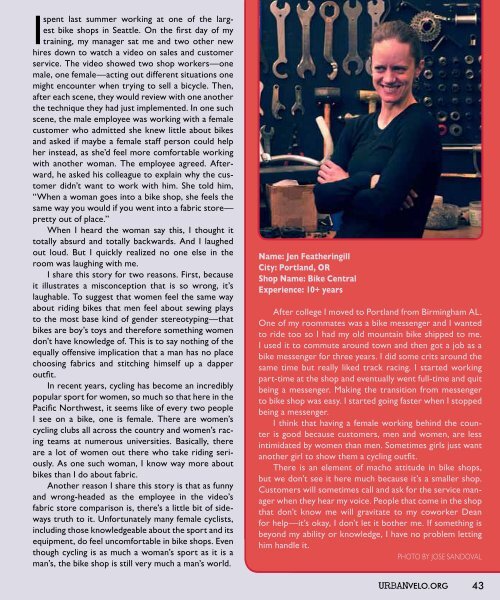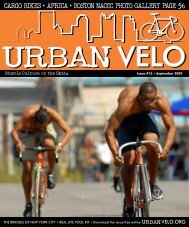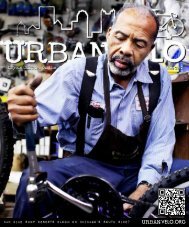Download PDF - Urban Velo
Download PDF - Urban Velo
Download PDF - Urban Velo
- No tags were found...
You also want an ePaper? Increase the reach of your titles
YUMPU automatically turns print PDFs into web optimized ePapers that Google loves.
Ispent last summer working at one of the largestbike shops in Seattle. On the first day of mytraining, my manager sat me and two other newhires down to watch a video on sales and customerservice. The video showed two shop workers—onemale, one female —acting out different situations onemight encounter when trying to sell a bicycle. Then,after each scene, they would review with one anotherthe technique they had just implemented. In one suchscene, the male employee was working with a femalecustomer who admitted she knew little about bikesand asked if maybe a female staff person could helpher instead, as she’d feel more comfortable workingwith another woman. The employee agreed. Afterward,he asked his colleague to explain why the customerdidn’t want to work with him. She told him,“When a woman goes into a bike shop, she feels thesame way you would if you went into a fabric store—pretty out of place.”When I heard the woman say this, I thought ittotally absurd and totally backwards. And I laughedout loud. But I quickly realized no one else in theroom was laughing with me.I share this story for two reasons. First, becauseit illustrates a misconception that is so wrong, it’slaughable. To suggest that women feel the same wayabout riding bikes that men feel about sewing playsto the most base kind of gender stereotyping—thatbikes are boy’s toys and therefore something womendon’t have knowledge of. This is to say nothing of theequally offensive implication that a man has no placechoosing fabrics and stitching himself up a dapperoutfit.In recent years, cycling has become an incrediblypopular sport for women, so much so that here in thePacific Northwest, it seems like of every two peopleI see on a bike, one is female. There are women’scycling clubs all across the country and women’s racingteams at numerous universities. Basically, thereare a lot of women out there who take riding seriously.As one such woman, I know way more aboutbikes than I do about fabric.Another reason I share this story is that as funnyand wrong-headed as the employee in the video’sfabric store comparison is, there’s a little bit of sidewaystruth to it. Unfortunately many female cyclists,including those knowledgeable about the sport and itsequipment, do feel uncomfortable in bike shops. Eventhough cycling is as much a woman’s sport as it is aman’s, the bike shop is still very much a man’s world.Name: Jen FeatheringillCity: Portland, ORShop Name: Bike CentralExperience: 10+ yearsAfter college I moved to Portland from Birmingham AL.One of my roommates was a bike messenger and I wantedto ride too so I had my old mountain bike shipped to me.I used it to commute around town and then got a job as abike messenger for three years. I did some crits around thesame time but really liked track racing. I started workingpart-time at the shop and eventually went full-time and quitbeing a messenger. Making the transition from messengerto bike shop was easy. I started going faster when I stoppedbeing a messenger.I think that having a female working behind the counteris good because customers, men and women, are lessintimidated by women than men. Sometimes girls just wantanother girl to show them a cycling outfit.There is an element of macho attitude in bike shops,but we don’t see it here much because it’s a smaller shop.Customers will sometimes call and ask for the service managerwhen they hear my voice. People that come in the shopthat don’t know me will gravitate to my coworker Deanfor help—it’s okay, I don’t let it bother me. If something isbeyond my ability or knowledge, I have no problem lettinghim handle it.Photo by JOSE SANDOVALURBANVELO.ORG43
















